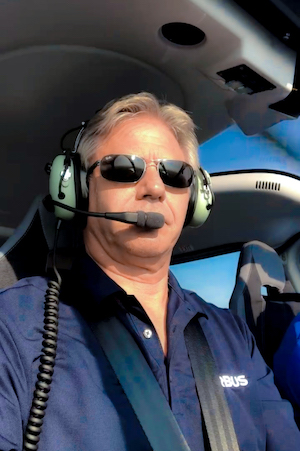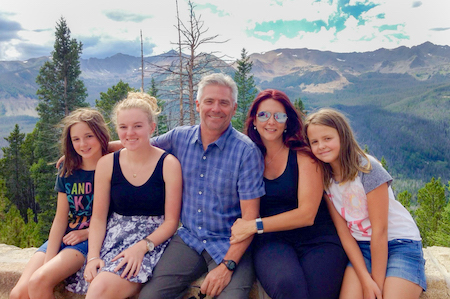|
Jul
03
2023
|
|
Posted 2 years 226 days ago ago by Admin
|
|

Todd Powers is now the VP of Sales for GPMS, a pioneer in predictive HUMS (health usage and monitoring systems) for aircraft. He’s also an active commercial pilot who flies part-time for a half-dozen of his customers to whom he sold helicopters in his previous sales role at Airbus. Yet despite his long and successful career in aviation, he first rebelled against working in the industry.
He rejected the industry as a career after his father, a recreational fixed-wing pilot and an administrator at Iowa Lakes Community College, created a college curriculum customized to usher his son into an airline pilot seat. “He started it the year that I was a high school senior and it’s still a pretty big program today. The first year of college, you get your private certificate and instrument ratings, and then in your second year, you get your Commercial and CFI. And then it was on to Great Lakes Airlines, (then a feeder for United Express airline) That was the path he had set for me, but it wasn’t my path.”
Rocky Mountain High, Colorado
Powers had a more downhill path in mind. “I’d been to Colorado a few times on vacation and I decided to go to the University of Colorado and ski—mostly ski. I’d grown up skiing on flat land and I wanted to ski those mountains!” Powers teased his parents, “They had 50 states to raise me and they picked the flattest one,” he says. “When I graduated high school, it was like I received my parole,” he jokes. During those “parole” years, Powers says he lived like Chris Farley’s character in “Tommy Boy.” Those were some fun years, but he had to purchase his ski-lift passes and pay his tabs; he found sales jobs to help pay his way through college. Those jobs became his practical, marketing education.
A Room with a View
In one such job, he was bored behind a desk in a real estate office, when he saw something that changed the course of his life: a Huey doing utility work lifting towers and poles. “I thought: You know, that's what I want to do to make a living, that doesn't look boring! How could you ever be bored doing a job like that? He decided to become a helicopter pilot, but first he had a few wild oats still left to sow. Before becoming a flying man at work, he sold all his possessions to travel “a land down under” (this was during the mid-1980s). He and his trusty backpack toured Australia, New Zealand, and Southeast Asia for a year and a half. When he returned to America, the first thing he did was enroll in a Minneapolis flight school in his native Midwest, a region he still appreciates. “Midwest people are some of the greatest people you can meet,” he says. Back then, the cost of living was relatively cheap in the Twin Cities, and he stayed in the same flight school to earn his CFI and to build up hours as an instructor.

To start his aviation career in earnest, he flew off to Maryland to run a flight school for Montgomery Aviation just outside Gaithersburg. “The seeds of aviation were planted by my father, but never really germinated until I was in my 20s,” he says. “He’d wanted me to become an airline pilot.” Actually, Powers ended up marrying an airline pilot he met in Maryland. “I was married to a Delta captain for 20 years, so, in the end my father was happy our family finally had an airline pilot.” That “mixed marriage” caused some humorous confusion: “Our young daughter thought all girls became fixed-wing pilots and boys grew up to fly helicopters.” He jokes, “I guess she was right, if you can drive a car, you can fly fixed-wing.”
NYC
His wife took a position with Continental Airlines in New York City, so Powers moved his career to NYC’s airspace, flying turbines for New York Helicopters/Island Helicopters. However, he really wanted to work for Liberty Helicopters because they flew A-stars, Dauphins, and Twin-Stars. So, Powers made a power play: “I actually flew to Liberty for my job interview in an Island Helicopter while I was on duty. Liberty hired me, I think, because I had the guts to arrive for my interview while on duty for Island.” Back then, Liberty only had three or four pilots and Powers got to grow up with Liberty as they grew. “Pat Day mentored me along the way and became my most active supporter,” he says. Powers was appointed Liberty’s training director and frequently found himself down in Grand Prairie, Texas, supervising Eurocopter’s training programs for every new Liberty hire. Then one surprising day, Eurocopter’s chief pilot and director asked Powers to stay in Texas and work for the OEM that would later rebrand as Airbus. They said to him, “You’re here more than our instructors and you’ve seen everything over and over again.” Day gave permission for his protégé to leave Liberty. “He supported my career advancement and I’ll always appreciate that,” says Powers. Therefore, in the mid-1990s, Powers began to work at Eurocopter (now Airbus Helicopters) as a factory pilot. He says, “It was the best job ever (other than flying around New York before 9/11) and I thought I’d finish my career at Airbus.”
Then the Powers got pregnant and the rotorcraft pilot returned to New York to help support his airline wife and baby. He got a job with Excel Air Services and flew as a twin-engine corporate pilot. Suddenly, the 9/11 terrorist attack caught everyone by surprise. On that fateful day Power’s helicopter got grounded at a helipad in Boston and he couldn’t fly it back to New York. The regulatory response to 9/11 changed New York’s airspace… and not necessarily for the better. “I was chatting with buddies at Air Methods and they offered me a job in Utah.” Powers took the opportunity to escape post-9/11 New York. “My wife could fly for the airlines out of Salt Lake City, so we moved,” he says.
Powers stayed in Utah flying helicopter air ambulance (HAA) for the University of Utah until 2004 before being called back to Eurocopter/Airbus to become their Regional Sales Manager for the Western US. In 2008, Powers left Eurocopter/Airbus for a short move to North Carolina where he took some time off to spend time with his daughter and he and his wife kite-surfed daily.
After a brief period of downtime on the Carolina coasts, Powers headed to Santa Rosa, California, to become the Chief Pilot for Reach Air Medical where he learned from another mentor, Vicky Spediacci. In 2011, he then returned to Eurocopter/Airbus after his former colleagues there, who had since risen to executive positions, offered him a lucrative opportunity in sales, where he became a top producer.
GPMS HUMS
He left his Airbus sales career in May 2022 to come to his current position as VP of sales at GPMS. Why move away from a secure OEM career to GPMS? Powers answers with several reasons:
“For years, I had been telling anyone who would listen that health and usage monitoring (HUMS) was going to be the future of aircraft maintenance. Instead of taking an aircraft out of service and taking it completely apart to inspect because a maintenance manual written back in the 1970s said it was time to, we were going to come to the day when the aircraft itself told us it was getting sick. That day is here with GPMS’ “Foresight MX” technology. We can now thoroughly inspect an aircraft 24/7/365 without taking a bolt off. It’s as if the aircraft is getting a colonoscopy every day.”
His enthusiasm for the GPMS product line is further fueled by his pilot experience. “I’ve got almost 10,000 flight hours in my career and I never had the detailed analytics that HUMS provides. I just blocked thoughts out of my mind and trusted that the aircraft was airworthy based on mechanics and manuals. I didn’t have real-time data on the aircraft I was flying that we can now provide to pilots and mechanics.”
He also believes HUMS technology will improve communication between those pilots and mechanics. “Usually, there’s a language barrier between pilots and mechanics. The average pilot tosses the keys to the mechanic and says something general like “it’s vibrating.” HUMS helps bridge that barrier by giving mechanics the information they need,” he says.

Finally, Powers says aviation has been good to his family that includes three college-age and older daughters. (The youngest just graduated high school.) He enjoys playing the golf course he lives by. He wants to see the helicopter industry stay economically viable for future generations and he’s concerned the current business model is breaking. “I also came to GPMS because I think our current system of sending aircraft back for $700,000 to $800,000 overhauls is not economically sustainable. The cost and revenue are going to start intersecting. That’s going to happen in the tour industry in approximately 2028 and the HAA operators are probably close to that point now, whether or not they admit it. You can’t sustain an operation when your costs exceed revenue and there comes a point when you cannot pass increasing costs to your customers.
You’ve Got a Friend
He concludes his reasons for coming to GPMS with a more personal reason. “Coming to GPMS has given me a great opportunity to visit all my old friends from my Airbus days and talk about something new. Now, I can even go see the people at Boeing in Seattle without wearing my Airbus shirt; that makes it easier to build a relationship,” he quips. GPMS has given me the opportunity to make a whole new group of friends.”
The industry he once spurned has found a friend who cares in Todd Powers.
READ MORE ROTOR PRO: https://justhelicopters.com/Magazine
WATCH ROTOR PRO YOUTUBE CHANNEL: https://buff.ly/3Md0T3y
You can also find us on
Instagram - https://www.instagram.com/rotorpro1
Facebook - https://www.facebook.com/rotorpro1
Twitter - https://twitter.com/justhelicopters
LinkedIn - https://www.linkedin.com/company/rotorpro1